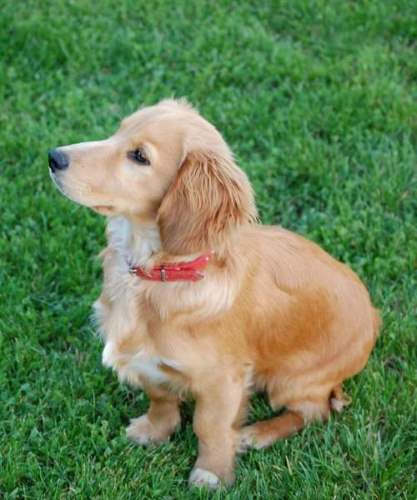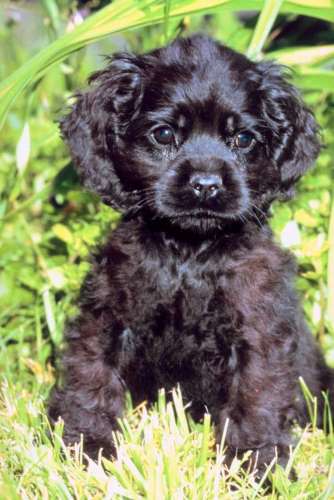- Home
- Questions about dogs and puppies
- My dog is peeing a lot!
My Dog Is Peeing A Lot, Should I Be Worried?
You're reading this because your dog is peeing a lot, much more than usual, and you're looking for answers. Visitors often ask questions about housebreaking issues, such as nervous or submissive peeing, their dog peeing at night, and dogs suddenly peeing on their owner's bed.
These potty training problems are why I decided to publish this article. At the bottom of this page, I share what some visitors had to say based on their experience with their dogs.
Help! My Dog Is Peeing A Lot!
How do you know if your dog is peeing too much?
How much is normal?
Well, what's normal largely depends on the age of your Cocker Spaniel.
Puppies
Puppies will pee more often than adult dogs for obvious reasons; their little bladders are small and still developing, so they need to be emptied more often.
Taking your young puppy out into the garden every hour or so is essential to allow him to pee. Regular pee breaks will help with your puppy's toilet training (and save your best rug!).
 I've finished peeing, mum! Can we play now?
I've finished peeing, mum! Can we play now?Adult Dogs
Adult dogs (assuming they are fully housetrained) can go without peeing anywhere from 4-8 hours, or more!
However, no two dogs are the same, so this varies from dog to dog. If necessary, my Cocker Spaniel, Max, can go without peeing for over 12 hours.
(Not that I ever expect him to do so, but I discovered this once when I was so ill I couldn't even get out of bed to let him into the garden until late in the afternoon. There wasn't one puddle in the house! Bless him.)
Senior Dogs
If your dog is getting on in years, you'll likely have to make allowances as he ages.
An older dog may have difficulty holding his bladder and sometimes his bowels and may need to do their toilet more often. If they don't have access to the garden, you may return home to little accidents on the floor.
Eventually, it comes to us all!
 Five cute Cocker Spaniel puppies all in a row!
Five cute Cocker Spaniel puppies all in a row!Why Is My Dog Peeing A Lot?
If your dog is peeing a lot, it's helpful to work out why; is it behavioural, or does he have an underlying health issue?
If your dog is peeing a lot because he's drinking much more water, working out what's causing this increased thirst is essential.
It may be as simple as it's a hot day, and he's thirsty, and his increased water intake is causing him to pee more.
Or it could be a symptom of an underlying health issue.
Health Issues
Several health issues could cause your dog to pee a lot, such as:
Incontinence
Although incontinence often presents in more senior dogs, it can often be seen in a Cocker Spaniel with health issues, such as bladder or urinary tract infections.
There is evidence to suggest that spayed female dogs are more prone to problems with bladder control. If your dog is incontinent, he probably won't be peeing more (in volume); your dog's pee will be in small amounts, dribs and drabs.
 Golden Cocker Spaniel taking a pee break
Golden Cocker Spaniel taking a pee breakDiabetes
Diabetes is a disease of the pancreas.
The pancreas has two main jobs; to produce digestive enzymes and insulin.
Digestive enzymes help to process food and insulin regulates your Cocker Spaniel's blood sugar levels by converting it into energy.
One of the symptoms of Diabetes in dogs is an increased thirst resulting in excessive peeing. So if you come home to find little puddles on your kitchen floor, and your dog is fully housetrained, you may need your vet to rule out Diabetes.
Kidney/Renal Disease
The function of your dog's kidneys (and ours!) is to remove toxins from the blood and eject them as waste through his pee.
One of the symptoms of kidney disease is an increased thirst, which in turn, causes your dog to pee more. When kidney disease is present, the pee is often quite pale in colour - things to note and pass on to your vet.
Medication
Medication can often result in side effects, and one of which is often an increased thirst. There's a theme going on here; need I say more?
Bladder/Urinary Tract Infections
Bladder/Urinary Tract Infections often cause involuntary peeing (small amounts); your dog may dribble and take longer than usual to pee.
Peeing can sometimes be painful, and your dog's wee may be tinged with blood.
Cushing's Disease
Cushing's disease in dogs causes an increased production of cortisol, and too much cortisol can make your dog very poorly.
This condition also increases the risk of bladder infections.
Cushing's disease can also make your Cocker very thirsty, and you may notice your pet frequently empties his water bowl and needs more pee breaks.
Age-Related
Age can have a bearing on your dog's water works, incontinence being a classic example. So if your dog is getting on in life, you may need to be a little more understanding and take a few little puddles in your stride!
Other Reasons Your Dog Is Peeing A Lot
There are others, but as I'm not a vet, I've only touched on a few and not in any depth.
If you see any of the above symptoms in your Cocker Spaniel, I urge you to take your pet to the vet to allow him to rule out underlying health issues.
Your vet must make any diagnosis of your pet's health; please don't try to diagnose it yourself.
 This little puppy is still being toilet trained
This little puppy is still being toilet trainedBehavioural Issues
If your dog is peeing a lot, it could be a behavioural issue rather than a symptom of a health problem.
Submissive/Excited/Nervous Peeing
Some behavioural problems can cause involuntary or increased peeing.
Does your dog dribble pee when visitors arrive?
His tail will wag like crazy, his back end may be slightly lowered, or he may crawl towards your visitor, leaving little dribbles behind him.
Does this sound familiar? These are tell-tale signs that your Cocker Spaniel is a submissive or nervous pee'er (is that a word?)
It's more prevalent in puppies, usually resulting from excitement, but they often grow out of it. However, submissive and nervous peeing will need to be addressed and can be minimised with training and confidence-building.
Territorial Marking
As an experienced dog owner, you'll know the difference between territorial marking and when your dog is peeing to relieve himself.
- When he's marking, he releases a few drops of urine to allow him to continue marking elsewhere.
- If he's relieving himself, he will empty his bladder.
Watch your dog closely and note how often he pees and the amount he pees; is he peeing in dribs and drabs, or is it a 'full' pee each time?
This information can help you decide whether your dog is peeing a lot, whether the problem is territorial or a health issue.
Any information you can give your vet will help him to diagnose an underlying health issue.
Summary: Why Is My Dog Peeing A Lot?
If your dog is drinking more water than usual, this will be the reason your dog is peeing a lot more. It makes sense, doesn't it?
However, it's essential to work out why he's drinking more water. His increase in thirst may be a symptom of an underlying health issue.
Monitor your dogs toilet habits closely and note how often he pees. Is he peeing more often than usual? How much more? Is he peeing in dribs and drabs, or is he peeing a 'full' pee each time?
The answers to these questions will help your vet to make an accurate diagnosis or rule out health issues and give your dog a clean bill of health.
If it's behavioural, you can begin to rectify or minimise the problem.
Points to Note:
Your Cocker Spaniel should always have a plentiful supply of fresh, clean drinking water.
Regular pee breaks are also essential, whether in the garden or for a quick walk around the block several times a day. This is in addition to his regular one-hour daily walk(s).
You must visit your vet for advice if you have any concerns about your dog's health or habits.
Visitor Questions & Comments
Stop My Dog Peeing A Lot!
Is My Dog Peeing Too Much?
Question By: Lila Iyer (Bangalore, India)
Hello! my dog is peeing a lot, and I'm worried.
I have a 21-month-old male cocker spaniel who needs to go out every 3 hours, or sometimes more often! Is my dog peeing a lot?
He drinks a lot of water - we're in Bangalore, India. I've provided him with a bucket of water since he prefers that to a bowl.
Can I regulate the amount of water by taking it away once he drinks after his meal to help stop him from peeing so much?
 Mom, I need to pee again!
Mom, I need to pee again!Also, he's been neutered. Consequently, he's put on 2 and 1/2 kgs in the past six months. (He is about 14" tall and now weighs 14.50 kgs) He refuses to go for walks.
However he loves to play within the compound, but it's sad to see him gasping for breath every now and then. Before his operation, envying friends often commented on his delightful vigorous play with all dogs he came across.
Regarding the latter problem, is it possible for him to regain his old active life, or is his lethargy also a result of the operation?
I would appreciate suggestions regarding diet, water input, and peeing problems.
Thank you.
My Dog Pees A Lot - Why?
Answer by: Pauline (Website Owner)
Hello Lila,
If he's drinking lots of water, it's only natural that your dog is peeing a lot. I suspect that it's nothing more complicated than that.
However, if your Cocker Spaniel shows any indication that he may be unwell or he begins behaving differently, I recommend you call your vet for advice.
I certainly wouldn't limit his intake of liquids, especially if it's hot where you live, as he'll need to stay hydrated. Drinking lots of fresh water will help him to do that.
Overweight Cocker Spaniel?
Your dog may need to lose a little weight, from what you say. Many cockers often put on weight after being neutered, but it's not a direct result of the operation. Their bodies need fewer calories than before the procedure, and we often don't compensate for this.
You can buy kibble for neutered dogs (fewer calories), or you can adjust his diet accordingly - your vet can probably help if you ask, just make sure he still gets all his vitamins and minerals to keep him healthy. You're aiming for a well-balanced nutritional diet.
Try to encourage your Cocker Spaniel to walk and give him a walk each day if you can. Nothing too strenuous at first. Try two short walks each day and gradually extend them. You say he likes to play in the compound; throw him a Frisbee or a ball and let him run around for as long as he enjoys. This should help to burn those extra calories.
Follow this link for more ideas on how you can help your dog to lose weight.
Once your dog starts losing the extra weight, he'll feel much better and will be able to jump about and exercise just like he used to before being neutered.
Best of luck to you both!
PS: Drinking lots and lots of water may be down to the heat, but it's also a symptom of diabetes. I don't want to worry you, Lila, and I'm sure your Cocker is okay, but it might be sensible to take him to see his vet and get him checked out - just to be on the safe side. Your vet will also be able to help with your dog's weight management.
Visitor Comments: Is My Dog Peeing Too Much?
Cocker Spaniel Dog Peeing A Lot
Comment by: Raji
Yes, I agree. If your dog drinks water when it's hot, it's only natural that your Cocker will pee a lot.
My question would be, are you sure he's drinking lots of water because it's hot, or does he have a health problem, such as diabetes? Have you had it checked by the vet?
My Cocker Spaniel Seems to Pee With Excitement
Excited Dog Peeing A Lot
Comment By: Jenny (San Juan)
 I can't help it Mom, honestly!
I can't help it Mom, honestly!My dog pees a lot; I think he's peeing too much.
He urinates when he gets happy or excited, especially when someone greets him or we try to play with him.
This has become such a problem that we're considering giving him away.
Does anyone have any advice, please?
Excited Dog Peeing A Lot
Answered By: Pauline (Website Owner)
Hello Jenny,
It would be such a shame if you had to give away your cocker spaniel because of this, but I understand your frustration.
Let's see if I can help you.
Cockers Over 12 Months
If your dog is over 1 year old, he may still grow out of it, but it's more likely that his peeing is down to his being submissive or nervous.
Subservient (or not very confident) dogs are usually relatively nervous, and this nervousness can often affect their behaviour in many ways, one of which is involuntary peeing.
Your dog really can't help it. Your Cocker Spaniel gets so excited he pees.
I fully sympathize, as this can't be easy to deal with. It eventually wears you down, huh?
I'm assuming you've tried the usual potty-training techniques and that he's fully house-trained (at least when he's not excited).
Rule Out Problems With His Waterworks
I would chat with your vet to make sure there are no medical problems that need dealing with and ask if (s)he could recommend anything to help.
Calming Your Cocker Spaniel
There are several options you can try to manage his nervous/submissive behaviour:
- Don't greet your dog when you come through the door; no eye contact, no verbal contact, no physical contact. Wait until he's calmed down and settled before you greet him.
- As your dog runs up to greet you, try throwing him his favourite toy or a small handful of kibble to distract his attention away from you.
- When it's time to greet your pet, do so calmly. Ask your dog to sit. Don't greet him until he's sitting quietly. Please don't make a fuss because this will further excite your pet and cause your dog to pee.
It can be challenging to ignore your Cocker when your return home - it's those big brown eyes and lovely wagging tail! However, the above will help to keep your Cocker Spaniel calm and help stop him from becoming too excited.
Don't scold him for nervous or submissive peeing (he really can't help it). You may even make matters worse.
Your other option is to consider using a Belly Band on your dog. Not only does it look cute, but it'll keep him dry too.
Please do let us know how you get on. I'd love to hear if you resolved this issue and if it helped you to keep your Cocker Spaniel rather than have him rehomed.
Good luck to you both!
Visitor Comments: Your Dog Is Peeing A Lot!
Dog Peeing A Lot!
Comment by: Anonymous
My little fellow does it, too, and I understand your frustration.
My vet told me to increase his self-confidence through obedience classes, but he had already successfully completed two courses.
I keep my affection warm but not excessively upbeat, which I find helps.
When friends visit, he doesn't have any control, so at those times, I either have a towel ready or use a belly band from a local pet store.
I had thought of purchasing several different belly bands from an online store, but he is in better control now. He turned two in July.
Good luck!
My Cocker Pees A Lot!
Comment by: Anonymous
I'm not sure how old these posts are, but for the poster above, please keep your dog even if he does pee in the house.
Maybe he has a urinary tract infection, perhaps even diabetes! Dogs can get both! I'd take him to the vet as soon as you can.
If you give up on him, you shouldn't have any pets; a pet is for life, or at least 15 to 20 years - it's a real commitment!
Photo Credits for Dog peeing a lot:
1. Benedeki at https://www.freeimages.com/photo/my-name-is-cuki-1358281
2. Aida_1982 at https://www.freeimages.com/photo/yalitos-1247890
3. Stefan Hatvani - https://www.freeimages.com/photo/dog-3-1363102
4. Jupiter Images at https://www.freeimages.com/photo/cocker-spaniel-puppy-in-the-grass-1984395
5. Visitor photo: Buddy
6. Visitor photo: Beautiful black Cocker Spaniel puppy


